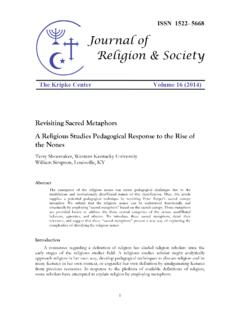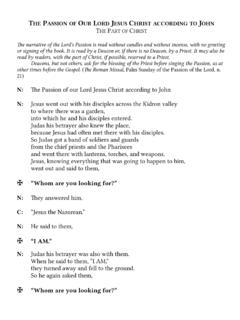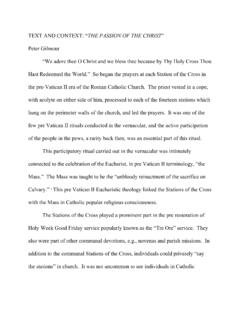Transcription of Mel Gibson’s The Passion of the Christ - Kripke Center
1 1 Journal of Religion & Society Supplement Series 1 The Kripke Center 2004 Mel gibson s T h e P a s s i o n o f t h e C h r i s t Edited by Ronald A. Simkins and William L. Blizek The Arrest and Sentencing of Jesus A Historical Reconstruction Philip A. Cunningham, Boston College Introduction [1] I am delighted to have been invited to participate in this symposium. However, I must confess to a certain amount of trepidation since I have been asked to speak on the difficult topic of reconstructing the historical circumstances of Jesus death in only forty-five minutes! This is challenging because the inconsistencies in the minimal historical evidence that we have available to us enable the construction of a number of plausible scenarios.
2 [2] Given these constraints, I will approach the subject using official Catholic teaching as the starting point for a consideration of our primary sources of information, the four Gospel Passion narratives. By examining three scenes in the Passion story and comparing what the different Gospel accounts describe, I will offer some conclusions about the historical events that lie behind them. These conclusions are fairly widely agreed upon in contemporary scripture scholarship. [3] As one of the professors invited by the Secretariat of Ecumenical and Interreligious Affairs of the Conference of Catholic Bishops to read a shooting script of Mel gibson s The Passion of the Christ , it is appropriate for me to proceed in this way.
3 At that time, I was primarily concerned to see if the shooting script conformed to Catholic teaching on the nature of the Gospels and in particular on the proper interpretation of the Passion narratives. That is how I will approach today s topic as well. T h e P a s s i o n o f t h e C h r i s t Journal of Religion & Society 2 Supplement Series 1 Catholic Teaching on the Nature and Interpretation of the Passion Narratives [4] At the outset, it is crucial to draw upon the Catholic awareness that in each Gospel text there may be present material from three different periods in early church history.
4 A 1964 instruction from the Pontifical Biblical Commission, Instruction on the Historical Truth of the Gospels, described these in terms of three stages of development (6-10). This schema was summarized and reiterated the following year in the Second Vatican Council s Dogmatic Constitution on Divine Revelation, Dei Verbum (19). I stress the authoritative and binding nature of these Catholic magisterial documents because in the debate over the gibson film too many Catholic voices are either ignorant or dismissive of this teaching. [5] In brief, the 1964 text described the three stages of Gospel development as follows: Stage 1: The Ministry of Jesus Traditions that date from Jesus words and deeds during his ministry in the late 20s and early 30s of the first century.
5 Stage 2: The Post-Resurrectional Preaching of the Apostles Ideas about Jesus that arose after the Resurrection, especially consideration about his divine identity, expressed through the exalted use of earlier terms such as Lord and Son of God . Stage 3: The Writing of the Gospels by the Evangelists The narratives about Jesus that are shaped by the situations, concerns and insights of the Gospel writers themselves. In other words, the four canonical Gospels incorporate traditions dating from Jesus ministry, which are understood through the experience of the Crucified One as Raised to transcendent life, and that are narrated according to the specific concerns, needs, interests, and insights of their respective authors.
6 The Gospels achieved their final form only decades after the life and death of Jesus, resulting in four distinctive accounts. [6] Of particular note is the fact that all the Gospels were written as the generation of eyewitnesses to Jesus ministry were dying (or being killed) and after the Roman destruction of the Temple in Jerusalem in the year 70. Living in the Roman Empire after the catastrophe of the Temple s demise, the evangelists shared some common interests, though with differing degrees of intensity and manifesting themselves in various ways in their writings.
7 Some of their interests were apologetic, meaning that they were defensively explanatory, while others were polemical, meaning that they were arguments developed in debates with other groups. Among their common concerns were: To have the Church accepted as a legitimate religion in the Roman Empire (apologetic). To argue for the Church s way of being Jewish in the aftermath of the Temple s destruction by the Roman in the year 70 (polemical). To explain why the Temple was destroyed (polemical). To show that the Church s claim that the Crucified One has been raised is consistent with the Scriptures of ancient Israel (apologetic).
8 In the case of the Passion narratives, these factors contributed to a tendency to de-emphasize Roman responsibility and to highlight the role of Jewish figures in bringing about the execution of Jesus. T h e P a s s i o n o f t h e C h r i s t Journal of Religion & Society 3 Supplement Series 1 [7] Before turning to the Gospel texts, a few other points about the three stages of Gospel development should be made. First, the evangelists did not write the Gospels to give us histories, as we understand the term. They were written, as the Gospel of John explains, so that you may come to believe that Jesus is the Christ , the Son of God, and that through believing you may have life in his name (John 20:31).
9 The Gospel writers primary interest was in promoting faith that the one crucified had been raised to Lordship and, contrary to modern preferences, they did not see researching all the available historical facts as essential to their project. They experienced Jesus as Raised; that was all they needed. [8] Having said this, it is also true that Stage 3 is the most important for Christian faith. It testifies to the evangelists inspired reflections on the meaning of Jesus life, death, and resurrection. Christians believe that the inspiration of the Holy Spirit functioned in the minds and hearts of the Gospel writers, shaping their insights and individual presentations of the story and significance of Jesus.
10 This inspiration did not include providing historical information to the evangelists, as their differences in historical details demonstrate. By discerning their distinctive perspectives, modern readers gain insight into the inspired mind of each of the Gospel writers as they encouraged faith in Jesus Christ . [9] This all means that to ask historical questions of the Gospels is to ask something they were not really meant to provide. Asking, what is the meaning of Jesus? or why is Jesus important? are appropriate questions. However, since modern readers have a consciousness that history shapes our perceptions and expressions, and since Westerners in particular tend to collapse truth to what is empirically verifiable, we will inevitably ask historical questions of the Gospels.











